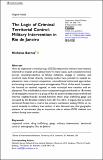The logic of criminal territorial control : military intervention in Rio de Janeiro
Abstract
How do organized criminal groups (OCGs) respond to military interventions intended to weaken and subdue them? In many cases, such crackdowns have proven counterproductive as OCGs militarize, engage in violence, and confront state forces directly. Existing studies have pointed to several explanations: inter-criminal competition, unconditional militarized approaches, and existing criminal governance arrangements. Much of this work, however, has focused on national, regional, or even municipal level variation and explanations. This article takes a micro-comparative approach based on 18 months of ethnographic research in a group of Rio de Janeiro favelas (impoverished and informal neighborhoods) divided between three drug trafficking gangs and occupied by the Brazilian military from 2014 to 2015. It argues that an active territorial threat from a rival is the primary mechanism leading OCGs to respond violently to military intervention. It also demonstrates that geographic patterns of recruitment play an important role in where OCG rivalries turn violent during intervention.
Citation
Barnes , N 2022 , ' The logic of criminal territorial control : military intervention in Rio de Janeiro ' , Comparative Political Studies , vol. 55 , no. 5 , pp. 789-831 . https://doi.org/10.1177/00104140211036035
Publication
Comparative Political Studies
Status
Peer reviewed
ISSN
0010-4140Type
Journal article
Description
The fieldwork on which this article is based received generous funding from the Social Science Research Council, the National Science Foundation, and the U.S. Department of Education Fulbright Program.Collections
Items in the St Andrews Research Repository are protected by copyright, with all rights reserved, unless otherwise indicated.

